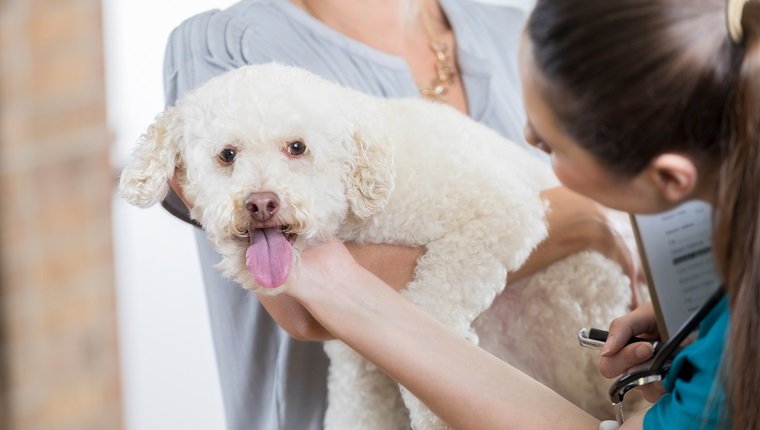Ursodiol for dogs is a bile acid used to treat liver disease and dissolve or prevent gallstones. Some people also know it by the brand names Actigall and Urso.
Ursodiol works by reducing the amount of cholesterol made by the liver, decreasing the amount of cholesterol absorbed by food, and also increasing the rate at which the body breaks down cholesterol. While it is not FDA approved for veterinary use, veterinarians commonly prescribe it for certain canine conditions.
The main ingredient in ursodiol is ursodeoxycholic acid, which is a natural component of the bile that a dog’s body normally produces. For that reason, dogs usually tolerate it well, but some side effects can occur. If your veterinarian prescribes ursodiol for use in your dog, then follow their instructions closely.
You can easily order ursodiol for your dog online from Chewy’s pharmacy with your vet’s prescription. Here’s what you should know about the uses, dosage, and side effects of ursodiol in dogs.
Uses Of Ursodiol For Dogs

Ursodiol for dogs is used to treat a variety of liver and gallbladder conditions. The liver and gallbladder are two organs that are highly affected by cholesterol, and the drug’s ability to reduce cholesterol in the body is beneficial to these organs.
Cholesterol is sometimes a component of gallstones, and ursodiol can help prevent these stones from forming. It also helps increase the flow of bile acid, which helps reduce toxic buildup of acid in the body.
Here are several of the conditions that a veterinarian might treat with a prescription for ursodiol:
- Primary sclerosing cholangitis
- Chronic hepatitis
- Non-alcoholic fatty liver disease
- Gallstones
- Congenital portosystemic shunts
- Juvenile fibrosing liver disease
Dosage Of Ursodiol For Dogs

The following is a guideline for general use of the drug in dogs and must not replace your veterinarian’s advice for your individual pet.
The usual dosage of ursodiol for dogs is 2.5 to 7 mg per pound of body weight given orally twice a day. You should give it to your dog with food, as this increases absorption.
Ursodiol is available in 300 mg capsules and 250 mg tablets. Do not give it to your dog without your vet’s approval.
Your vet will give you further instructions on proper dosage. They may also wish to adjust the dosage based on your dog’s condition and individual response to the drug.
The duration of the prescription can vary, but you should continue to administer the drug to your dog until your vet instructs you to stop, as ending treatment early could result in relapse.
Side Effects Of Ursodiol For Dogs

The side effects of ursodiol in dogs are generally mild if they appear at all. The main ingredient in the medication naturally exists in dogs’ bile, so dogs usually tolerate it well.
There are, however, some side effects that may appear, and if these are cause for concern, you should contact your veterinarian, as they may wish to alter the dosage or seek an alternative form of treatment.
Here are a few of the side effects of ursodiol in dogs:
- Headache
- Nausea
- Upset stomach
- Diarrhea
- Worsening of liver disease
Make sure your vet is aware of any other medical conditions your dog has, as well as any other medications your dog takes, especially Tylenol, antacids, and vitamin supplements, as these may react poorly with ursodiol.
As with all drugs, there is a risk of allergic reaction that could lead to anaphylaxis, a potentially life-threatening condition. If you see the signs of an allergic reaction, including hives, swelling, difficulty breathing, sneezing, or other symptoms, then contact your vet right away.
Has your dog ever taken ursodiol? Did it help with their condition? Then let us know in the comments below!









